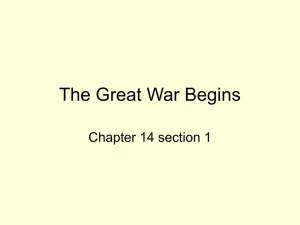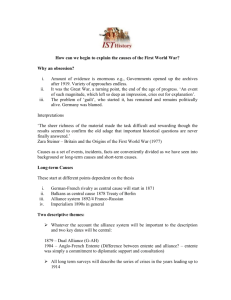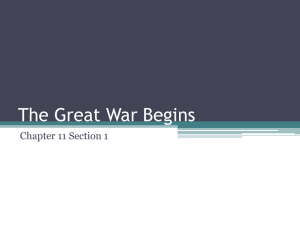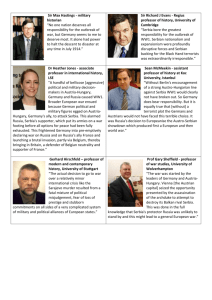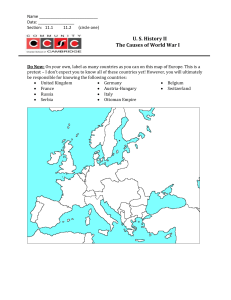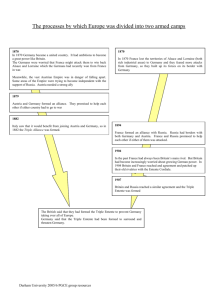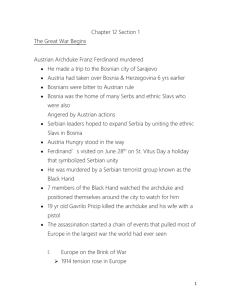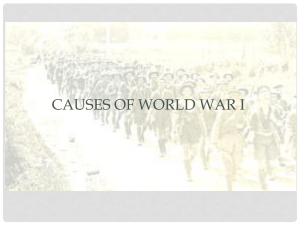Root Causes of WWI: MANIA
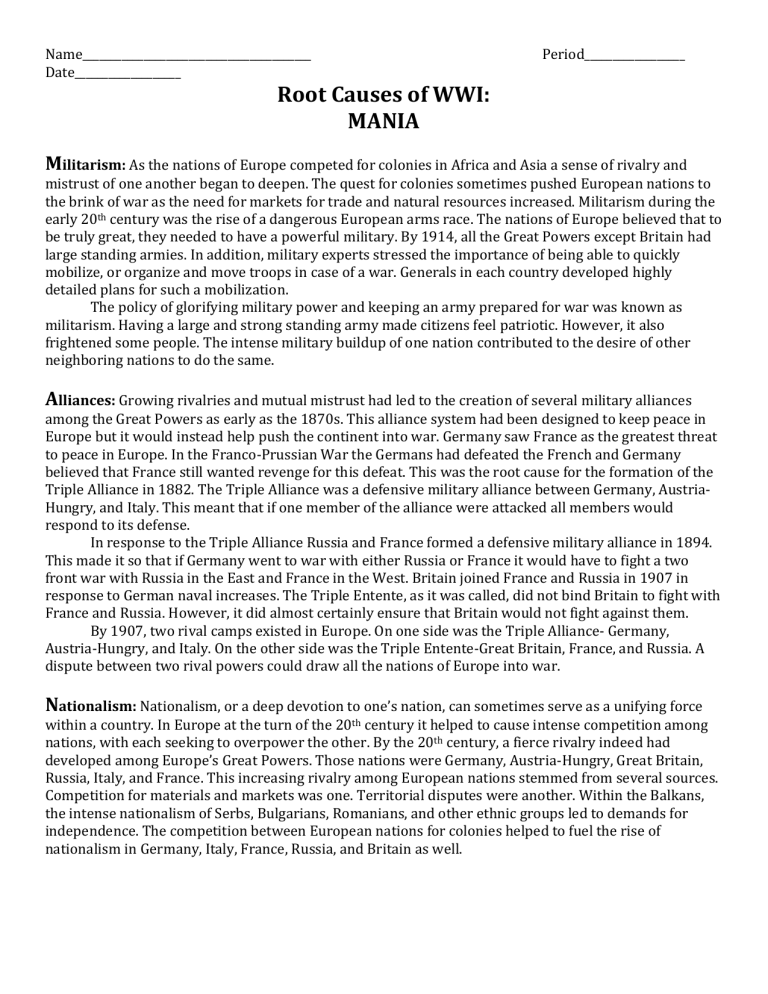
Name_________________________________________
Date___________________
Root Causes of WWI:
MANIA
Period__________________
M ilitarism: As the nations of Europe competed for colonies in Africa and Asia a sense of rivalry and mistrust of one another began to deepen. The quest for colonies sometimes pushed European nations to the brink of war as the need for markets for trade and natural resources increased. Militarism during the early 20 th century was the rise of a dangerous European arms race. The nations of Europe believed that to be truly great, they needed to have a powerful military. By 1914, all the Great Powers except Britain had large standing armies. In addition, military experts stressed the importance of being able to quickly mobilize, or organize and move troops in case of a war. Generals in each country developed highly detailed plans for such a mobilization.
The policy of glorifying military power and keeping an army prepared for war was known as militarism. Having a large and strong standing army made citizens feel patriotic. However, it also frightened some people. The intense military buildup of one nation contributed to the desire of other neighboring nations to do the same.
A lliances: Growing rivalries and mutual mistrust had led to the creation of several military alliances among the Great Powers as early as the 1870s. This alliance system had been designed to keep peace in
Europe but it would instead help push the continent into war. Germany saw France as the greatest threat to peace in Europe. In the Franco-Prussian War the Germans had defeated the French and Germany believed that France still wanted revenge for this defeat. This was the root cause for the formation of the
Triple Alliance in 1882. The Triple Alliance was a defensive military alliance between Germany, Austria-
Hungry, and Italy. This meant that if one member of the alliance were attacked all members would respond to its defense.
In response to the Triple Alliance Russia and France formed a defensive military alliance in 1894.
This made it so that if Germany went to war with either Russia or France it would have to fight a two front war with Russia in the East and France in the West. Britain joined France and Russia in 1907 in response to German naval increases. The Triple Entente, as it was called, did not bind Britain to fight with
France and Russia. However, it did almost certainly ensure that Britain would not fight against them.
By 1907, two rival camps existed in Europe. On one side was the Triple Alliance- Germany,
Austria-Hungry, and Italy. On the other side was the Triple Entente-Great Britain, France, and Russia. A dispute between two rival powers could draw all the nations of Europe into war.
N ationalism: Nationalism, or a deep devotion to one’s nation, can sometimes serve as a unifying force within a country. In Europe at the turn of the 20 th century it helped to cause intense competition among nations, with each seeking to overpower the other. By the 20 th century, a fierce rivalry indeed had developed among Europe’s Great Powers. Those nations were Germany, Austria-Hungry, Great Britain,
Russia, Italy, and France. This increasing rivalry among European nations stemmed from several sources.
Competition for materials and markets was one. Territorial disputes were another. Within the Balkans, the intense nationalism of Serbs, Bulgarians, Romanians, and other ethnic groups led to demands for independence. The competition between European nations for colonies helped to fuel the rise of nationalism in Germany, Italy, France, Russia, and Britain as well.
I mperialism: The four decades between 1870 and 1914 witnessed Europe’s love affair with imperialism- a policy best described as “throwing your nation’s weight around.” This was because Europe had the firepower to back up its ideology and desire for conquest. Guns prevailed over spears, the telegraph over signal drums, and the gunboat over the war canoe- and so Europe prevailed over the world. Competition for new trade marketplaces and new sources of raw materials was a strong source of tension for European nations. Britain and Germany were in competition for carving out colonies in the
Middle East and Africa while Russia and Austria-Hungry were competing over control of the Balkans.
Competition for colonies contributed to the desire of European powers to increase the size and strength of their militaries. As militarism in Europe increased so did imperialism and as imperialism increased so did militarism. These two forces were the major reasons that European powers turned toward alliances to protect and increase their global strength.
A ssassination: The Balkan Peninsula in 1914 was known as the “powder keg” of Europe. This was because nationalism, pride and patriotism in one’s nation or ethnic group, had reached a feverish pitch in this region of Europe. In particular, many ethic groups of the Austro-Hungarian Empire such as the Poles,
Czechs, Slovaks, Croats, and Serbs wanted their independence. As influence of the Ottoman Empire in the
Balkans declined in the early 1900s many ethic groups succeeded in breaking away from their former rulers. These people formed new nations, including Bulgaria, Greece, Montenegro, Romania, and Serbia.
Serbia had a large Slavic population. It hoped to absorb all the Slavs on the Balkan Peninsula.
Russia, itself a mostly Slavic nation, supported Serbian nationalism. However, Serbia’s powerful northern neighbor, Austria-Hungry, opposed such an effort. Austria feared that efforts to create a Slavic state would stir rebellion among its Slavic population and the very stability of the Austro-Hungarian nation. In
1908 Austria annexed, or took over, Bosnia and Herzegovina which were two Balkan areas with large
Slavic populations. This caused Serbian leaders to be outraged, and in the years that followed tensions between Austria and Serbia steadily rose. The Serbs vowed to take Bosnia and Herzegovina away from
Austria and the Austrians vowed to crush any Serbian effort to undermine its authority in the Balkans.
Into this atmosphere of mutual dislike and mistrust stepped the heir to the Austro-Hungarian throne, Archduke Franz Ferdinand and his wife on June 28 th , 1914. They were visiting Sarajevo, the capitol of Bosnia. It would be their last. The Archduke and his wife were shot at point-blank range as they rode through the streets of Sarajevo in an open car. The killer was Gavrilo Princip, a 19-year-old Serbian and member of the Black Hand. The Black Hand was a secret society committed to ridding Bosnia of
Austrian rule.
Because the assassin was a Serbian, Austria decided to use the murders as an excuse to punish
Serbia. Austria presented Serbia with an ultimatum containing many demands. Refusing the demands would mean that Serbia would go to war with the much more powerful Austria. Therefore the Serbian leaders agreed to most of Austria’s demands. They offered to have several others settled by an international conference.
Austria was in no mood to negotiate. The nation’s leaders, it seemed, had already settled on war.
On July 18, 1914 Austria rejected Serbia’s offer and declared war. That same day, Russia, an ally of Serbia with its largely Slavic population, took action. Russian leaders ordered the mobilization of troops toward the Austrian border. Leaders all over Europe suddenly took notice. The fragile European stability seemed ready to collapse into armed conflict. The British foreign minister, the Italian government, and even
Germany urged Austria and Russia to negotiate. But it was too late. The machinery of war had been set in motion.
